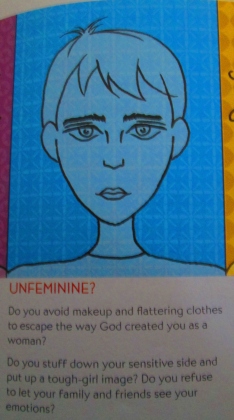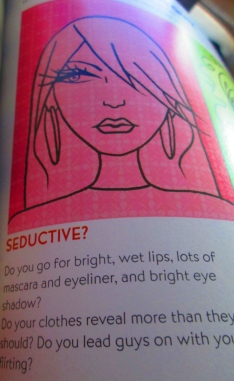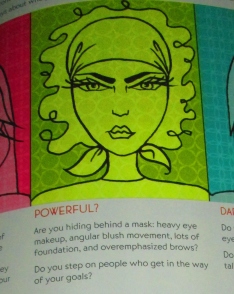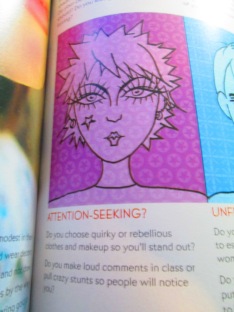I was ugly, and I knew it. I was chubby, I had dark hair growing on my upper lip and between my eyebrows, and my breasts were too big. I was only fifteen years old, but already I knew that I did not look pretty and feminine like Good Christian Women are supposed to look. I was told that outward appearances did not matter, that it was what was inside that mattered, but then the women who gave testimonials at church or were otherwise held up as examples of Good Christian Women all exuded a sort of radiant “pure” beauty that was held up as the ideal the way Good Christian Women were supposed to look—and it was a standard I couldn’t hope to achieve.
There’s an odd sort of dissonance in evangelicalism surrounding women’s appearances. Evangelicals claim on the one hand that outward appearances do not matter and that it is what is inside that matters, but they also say that outward appearances are reflections of what is inside—and expect women to be both conventionally pretty and conventionally feminine. Blogger Toranse at Somatic Strength recently brought all of this back to me. I’m going to quote from their post on the topic, and then add more of my own thoughts and experiences.
For months now, I’ve been trying to find the words to write about Christian culture’s beauty standards. It’s hard to put into words, though, because much of it isn’t very explicit. What Christianity says is that women/girls (and those people it categorizes as such) shouldn’t care about their looks. Caring about looks is part of the sinful, superficial world, and a woman should only care about inner beauty: things like modesty, purity, gentleness, kindness, and most especially, innocence.
But what Christianity really means is far different. For instance, I just recently checked out a Christian magazine-type book called SHE Teen (Safe, Healthy, and Empowered) put together by Rebecca St. James. “Your remote control could tell you that we’re pretty much addicted to beauty” it says as it gives beauty tips that let you know that you better not think for a minute you can get away with not caring about your appearance. The message seems to be: you shouldn’t care about your physical appearance by worldly standards, but you definitely have an obligation to think and care about it by spiritual standards.
And it’s not just this — most Christian literature aimed at women links beauty with femininity and femininity next to godliness. This was the message I received from books like Captivating and from messages about what a woman was “supposed” to be.
While dismissing “worldly” standards of beauty, Christian culture actually holds women up to an even higher standard of appearance: your physical beauty is both entirely dependent on who you are as a person and how you conform to feminine standards of behavior and you should meet Christian standards of beauty appearance while pretending that you’re not focusing at all on your beauty.
And because beauty standards are linked to spiritual, Christian culture can move far beyond even the virgin/whore dichotomy and into realms where the fate of your soul is determined by the beauty image you cultivate.
The problem with these beauty standards is that, while things like femininity, purity, modesty, and innocence are what’s explicitly talked about, there is a very specific body type that Christian culture judges as acceptable manifestations of these traits. Chest size is probably the most obvious: the bigger the breasts, the more Christian culture judges you to be immodest, regardless of how you dress. Unless you wear a loose-fitting sack, but then you’ll probably be judged as not embracing your God-given femininity.
But it goes beyond that, too. You need to be thin. You need to have just enough curves as to not look like a boy (need to look feminine!) but not enough that you fail modesty standards by having a body boys might look at. You better be appealing to men, but not turn them on. You need to be innocent of all knowledge of sex and bodies. In short, you need to be, in both look and personality, a character from an Old West Christian novel.
Yes, yes, yes. This was my experience too. Evangelicals say outward appearances don’t matter . . . but they sure as heck don’t appear to mean that. Outward appearances matter a lot—they determine whether you meet the standards of being a Good Christian Woman, or whether you fall short. And if you’re not properly feminine and pretty, you are falling short.
I fell short.
My mother told me I should lose some weight. My mother told me I should try to be more graceful and feminine. My mother told me to talk more quietly, to walk more slowly, and to smile more often. She would probably have helped me choose a more “attractive” wardrobe and taught me how to apply a “natural” amount of makeup, thus making myself acceptably and conventionally pretty, but I had despaired of my appearances so thoroughly that I didn’t even want to try. I determined that if a guy would be so shallow as to marry me based on my looks, then he wasn’t the kind of guy I wanted to marry anyway. Accepting that I was ugly and unattractive and would always be so, I put my energy into my homemaking skills—cooking, cleaning, and childcare—and hoped to attract a guy through those.
Do you know what I don’t remember being told? That I should develop my own sense of style. That people come in different shapes and sizes. That different people find different things beautiful. That being healthy and comfortable in my skin was more important than being classically beautiful. Instead, I was told that outward appearances are a reflection of one’s inward spiritual state. Evangelicals say that it is what is inside, not what is outside, that matters, and then they tell you that what is outside is a reflection of what is inside. If you are properly pure and godly, fitting yourself to God’s plan, you will be conventionally pretty at the very least.
Toranse included images from evangelical music artist Rebecca St. James’s SHE magazine, and I find them fascinating. They’re illustrative of the way evangelical beauty standards push women to conform to a specific ideal and at the same time warn them against developing their own style or standards or trying to stick out.


At this point you can surmise that the point of this is, “Does your makeup express some unique aspect of you? Well, stop it.”
My mother had me take something called Christian Charm Course. She taught it to my close in age sister and I, together with some other homeschooled girls. We would sit together around the kitchen table and go over that week’s lesson. I’ve ordered the workbook on Amazon because I want to look at it again, from my current vantage point, and possibly share some of it here. For the moment, I want to share some Amazon reviews. First, a one star review:
This book is truly the most appalling book I have ever seen used in Christian homes and schools. The original copyright date is 1967 but it looks and reads more like 1937. The demands that it makes on young women are ridiculous and totally unfounded spiritually. The book states that a young lady should always have her hands clasped behind her back and never down at her sides. While standing, her feet should not point forward but instead one foot should be behind the other at an angle. While sitting, ankles should be linked together to the side and under the chair. (Which is actually very bad for healthy circulation.) The book is also an aid to eating disorders by emphasizing a girl’s look and figure instead of simple healthy eating. A calorie guide is included and all of the ways to take measurements literally from head to toe. It’s ridiculous books like this that make Christian women look like idiots and imbeciles to the world instead of vital, dynamic, and strong followers of Christ.
Next, some five star reviews:
I liked the materials and found it helpful in preparing lessons to teach young girls to be christian based ladies.
I went through this book when I was a pre-teen and it helped to teach me how to be a lady. Young girls needed it then, but if you look around in today’s society, they need it more now. This book addresses topics on outward and inward appearances that help young girls learn what is appropriate dress and what isn’t. It has a scriptural side to everything taught. I’ll be using this book with my daughter to help guide her into womanhood.
When I first laid eyes on the workbook, I fell in love with it. It gives a step-by-step guide into turning our little tomboys into princesses. It is fun to read and all teenage girls love it. Because of the Biblical background to assist in training our young girls, this is a perfect addition to your church library.
Outward appearances don’t matter my foot. Evangelicals may claim that outward appearances don’t matter, but the message they send to their adolescent girls is often a very different one entirely. I was ugly—and I knew it.

















